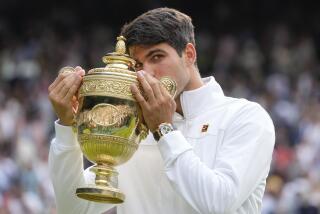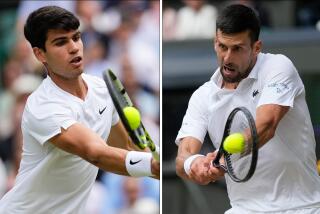At Wimbledon, Andy Murray makes Britain’s dream come true
- Share via
WIMBLEDON, England — There were shouted proposals of marriage from the crowd. A nervous nation glued to the television, long years of frustration suggesting that a fateful string of mistakes was right around the corner. But this time, when the last backhander hit the net, it was time to celebrate.
Andy Murray’s victory Sunday in the men’s singles at Wimbledon was a collective dream come true for Britain, a triumph to be savored after disappointing decades when, year after year, someone else’s son walked away with the title.
Murray has had his issues with some of his fellow Britons. Ranked No. 2 in the world, he has known success on the tennis court, reaching the final here last year before going on to win gold at the Olympic Summer Games in London and then the U.S. Open title.
But this is Wimbledon. Virginia Wade won the women’s title in 1977, but not since Fred Perry in 1936 had a British man triumphed. A statue of Perry on the Wimbledon grounds served to remind Britons of how long the wait had been.
So Britain lived and died with every shot Sunday. Groans for errors; cheers for points. Fans with their faces painted in the colors of the British flag. (The flag itself is banned from the Wimbledon stands.)
“Andy, will you marry me?” someone shouted from the crowd.
“I love you, Andy!” followed quickly by, “Me too!”
As was the case last year, both British Prime Minister David Cameron and Scottish First Minister Alex Salmond were in the royal box to watch the match. Labor Party leader Ed Miliband was also present.
Previous players, particularly Tim Henman, came to symbolize British striving but also the country’s failure to break through. Henman embodied a certain middle-class Englishness, a gentlemanly competitor who never failed to try his best but who came up short.
In contrast, not everyone in Britain has always loved Murray, a 26-year-old from Scotland whose sometimes dour demeanor on the court did not endear him to the rest of the nation. Neither did his Scottish nationalism. He once told an interviewer that he supported whatever soccer team happened to be playing against England. Such comments gave credence to the saying that when Murray won, the country considered him British — but when he lost, he was a Scot.
But his heartfelt, weepy runner’s up speech at Wimbledon last year helped rehabilitate his reputation with his detractors. Others found his life story inspiring: As a child, he lived through the 1996 massacre of 16 boys and girls at his school in Dunblane, Scotland, by a gunman who then committed suicide.
All of Dunblane was watching Sunday, many of its residents jammed into a local sports club to watch the match with Murray’s grandparents. After the victory, there was an impromptu, scraggly parade led by a bagpiper.
In London, Andrew Bull, 37, a deputy head teacher at a high school, declared Murray’s 6-4, 7-5, 6-4 victory over Novak Djokovic a “cracking match.”
“Murray got frustrated sometimes, but I don’t think there was any doubt from the moment he stepped on the court that he was going to win,” Bull said. “My 8-year-old son was so excited after the match, he turned a cartwheel. I teach in an all-boys school, and it will be all over the school tomorrow.”
Elizabeth Dendy, a retired West London teacher, credited the crowd at Wimbledon with helping Murray overcome a propensity for making strings of errors that she finds hard to watch.
Miryam Dragonetti, a 32-year-old mother of three, said she was expecting a longer match, particularly when Djokovic started battling back in the second set. “So great that Andy Murray won,” she said, “especially after last year when he broke down in tears after the final.”
As he got close to the title Sunday, even the security guards and stewards at Wimbledon skirted the site’s traditional decorum. Large numbers of them could be seen leaving their posts to peek inside the windows of the media center, where they could get a better view on large television screens.
When Djokovic’s last shot hit the net, Murray knelt on the grass in relief and exultation and then climbed toward the box where his friends and family sat. He began to descend to the court for the awards ceremony, only to realize that he had forgotten to hug his mother, Judy.
“I just heard her screaming behind me, and I went back,” he said in an on-court interview.
Henman Hill is the name of a grassy rise where fans who don’t have court tickets can watch the matches on a giant screen. Temporarily renamed Murray Mound or Murray Mount, it was filled with people who spent hours under the sun and then roared at their hero’s victory. They roared again when BBC cameras showed them on national television.
Commentators said the noise was like nothing they’d ever heard at Wimbledon. Murray acknowledged that the crowd had helped see him through.
“The end of the match, that was incredibly loud, very noisy,” he said. “I’ve been saying it all week, but it does make a difference. It really helps when the crowd’s like that, the atmosphere is like that.”
Janet Stobart in The Times’ London bureau contributed to this report.
More to Read
Sign up for Essential California
The most important California stories and recommendations in your inbox every morning.
You may occasionally receive promotional content from the Los Angeles Times.















